-
THE BOOK OF FISH 자산어보 (Lee Joon-ik 2021)
LEE JOON-IK: THE BOOK OF FISH 자산어보 (2021)
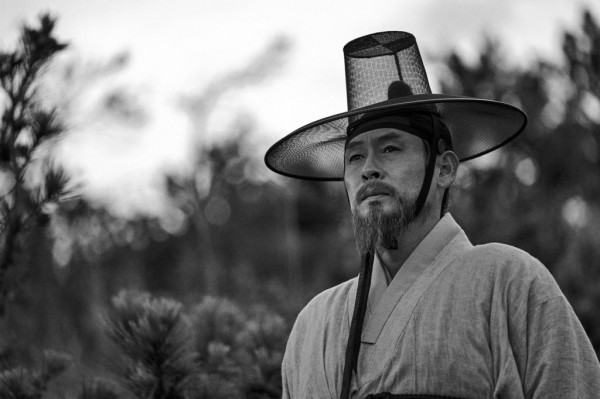
SOL KYUNG-GU IN THE BOOK OF FISH
Meeting of minds and crossing of social boundaries in period Korea
This South Korean black and white historical film set in the early 1800's, which has a clean, handsome look, provides cozy uplift and a a nice break from contemporary urban Asian angst or violent '80's-period yakuza movies. Its picture of the bonding between an upperclass intellectual and an illegitimate island fisherman who wants to master the classics is almost too good to be true, and each beat can be anticipated, but is nonetheless satisfying. It's like a YA novel for adults. It is sometimes marred by ridiculously rude, vernacular, expletive and F-word intense subtitles. Even if some of the dialogue is that slangy and vulgar, which would seem highly inappropriate for a Korean island two centuries ago, it would be even more wrong to render it in valley girl-rapper slang. But the subtitles occasionally also painstakingly transliterate some Korean phrases when poetry is composed.
This is the last century of the 500-year Joseon era, which encouraged the entrenchment of Confucian ideals and doctrines in Korean society. As part of this the king has sequestered three brothers, one, Jung (or Chung) Yak-jeong (Sol Kyung-gu), a Christian convert, he sends to remote Heuksando island as a dangerous influence. Exile is the best place for the lonely intellectual to study and write books. The loneliness is mitigated for Jung by the solid single lady (the excellent Lee Jeong-eun) who takes him in. She finds him handsome; he finds her earthy truth-telling provides its own kind of wisdom not in books.
At first the hunky, slightly scruffy young fisherman, Chang-dae (Byun Yo-han), scorns Jung, as the authorities have told the islanders to do. Illegitimate son of a nobleman and a concubine, he is a would-be intellectual himself, thinking that sophisticated learning will convince his father to legitimize him. (It will take a while.) On the island, Chang-dae and Jung are constantly running crossing paths, and they soon learn how much they need each other. The knowledge of Chinese characters that reading Korean required at this time makes being self-taught not really possible, and Jung finds out that the brilliant Chang-dae has a detailed knowledge of sea creatures not found in any book. Jung wants to write a piscine encyclopedia (Jasaneobo; the film title), going out in the boat with Chang-dae and making notes, and in exchange elucidating the classical texts for his pupil.
Material like this can only be brought to life through the clash of personalities, which becomes the real subject - with Jung's hostess mellowing out the macho head-butting. The two men's efforts lead to a local school where Jung designates Chang-dae as the apostle of literacy to the island children. Things end happily, with a hint of sadness: Chang-dae's venture into being an aristocrat ends badly because he is too upright to be a cynical bureaucrat as is expected, and after a long association, he misses his master's final years..
Lee Jook-ik is a director who specializes in history laced with fiction and while the exiled Christian book author is historical, Chang-dae appears to be an invention. The ideas are real and engaging. It's not every day that intellectual endeavor and book-writing are so successfully brought to life and Lee deserves credit even if the movie, penned by Kim Se-Gyeom, is a bit simplistic and sentimental at times. A local critic commented that the two leads are fine (they are), the black and white makes the images look "like a Joseon Dynasty ink painting," and the Heuksando Island scenery makes the movie a pleasure. Dp Lee Eui-tae creates images that are elegant and soothing, even if the sense of the period is marred by a slight blandness, too many cute kids, and a too-sweet rapport among the sexes.
The Book of the Fish 자산어보, 126 mins., Mar. 31, 2021 in S.KOrea. i]The Book of the Fish [/i] 자산어보, 126 mins., Mar. 31, 2021 in South Korea. The film won the Grand Prize at 57th Baeksang Arts Awards in May 2021. Aug. 21, 2021 it is released as part of the 2021 NY Asian Film Festival (Aug. 6-22). Aug. 21, 2021 it is released as part of the 2021 NY Asian Film Festival (Aug. 6-22).
Last edited by Chris Knipp; 08-12-2021 at 09:56 PM.
-
JOINT (Oudai Kojima 2020)
OUDAI KOJIMA: JOINT (2020)
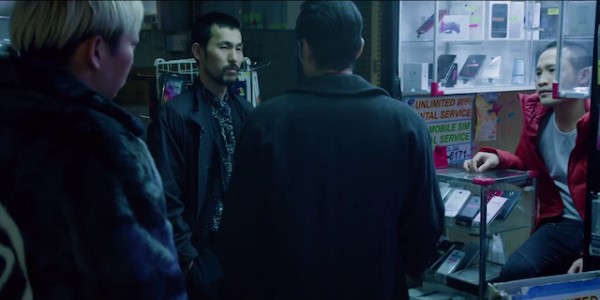
RECRUITING IN JOINT
TRAILER [without subtitles]
Reaching for the straight life through a crime gone tech
In his first feature, reportedly made for only $50,000, the very young director Oudai Kojima (he was born in 1994 and grew up in New York City till age 13) has subtly revolutionized Japanese yakuza movies. This is a picture unlikely to be shown in American theaters, though it might turn up in more adventurous Parisian ones. Kojima's new approach is twofold, style and content, though when that works you can't easily separate the two. There's a distinctive vérité shaky cam look in the cinematography of Shintaro Teramoto, with the camera up close on faces at different angles; there are regular on-screen explanations of terms that act as minor chapter headings and the action is informed by a researched documentary realism. There are quiet voiceovers by the main character and a few other explanatory voiceovers. The effect is fresh and nimble and personal. It starts out noirish, and when there is a shift to gang war, the intimate, stylish feel is still maintained, with a keen sense of the varied, sometimes very downbeat, digs and meeting places battling clan members pass through.
The point of view is of Takeshi Ishigami (Ikken Yamamoto), whose extralegal activities got him two years in prison. We don't see that. We only glimpse the end of the two more years next spent at a construction job saving up capital to restart his life. As we pick up with him, he gets help from his best friend Yasu in moving bak to Tokyo. Takeshi was never a hard core gangster type but a smooth operator, a scam artist, an extortionist (one gathers), who's good with money. (This of ourse however fits with the new fous of Japanese organized crime, which is also to fous on legitimate business.)
This is a world of new, cyber-supported crime. The cops have more access to information but so do the criminals. Thumb drives, data mining, and digital startups play key roles. Takeshi starts out buying a fake business. He returns to his previous "list business" - harvesting information that he resells for fraud schemes.
We don't know how Takeshi all his new money but he's soon making a lot of it and enlisting the aid of an old pal who's rich to add to investments that include buildings and, to launder cash, a startup that becomes so successful the big yakuza clan buys it.
The yakuza is different, though it will revert to type before long. It has banished its most violent members, but they start their own clan, which starts on horning in on the businesses the "polite" clan controls. Takeshi wants to be "clean," to get out of crime. But before he can do that, to raise funds, he wants to do just a bit of thoroughly illegal scamming and enlists his Korean friend Jung-hi(Kim Jin-cheol)and starts a business selling data for phone fraud to his Yakuza friend Yuki.
The scammers, to avoid police detection, phone from cars. All very new and soft core. There's a new generation of lean, rangy young yakuza or would be yakuza crooks who don't smoke, don't wear suits, and have floppy hair. They look rather like punks sometimes and at others like Japanese versions of Silicon Valley geniuses. In fact, after amassing funds, some of which we have no idea how he gets, and which include buying a whole building, Takeshi buys into a startup data app company and when he accompanies the scrawny geeks at the presentation for an powerful and rich firm, he becomes the more powerful and influential presenter.
Ikken Yamamoto, who plays Takeshi, is a tallish, handsome dude. He doesn't look extremely Japanese, though there is at least one other gangster whose face is totally Caucasian, and he's not like that; but he's neutrally movie-star handsome. After Takeshi goes into successful operation, he starts looking posh, and one gangster wants to mimic his long elegant leather coat. Unfortunately, he has a criminal record, which includes jail time. This is one bar to his leaving crime behind or being accepted as trustworthy in business. It sticks to him. The other is that the ruling clan wants him. They have no intention of his being so successful and not getting a cut, and a mysterious organization headed by "J" gets involved in his business plan. Once the needle goes in it never comes out. Plus ça change. . . All the film's themes are neatly embodied in its central character.
Unfortunately like nearly any yakuza movie - except that other Takeshi's, Takeshi Kitano's - the simple English-titled Joint eventually becomes a bit overcomplicated when it gets involved in gang war. There is torture, there is assassination, and there is even a clan elder executing a disloyal reprobate up close with a long knife. There is also more fruit of the director's research: the social commentary of how immigrants are forced to engage in crime in Japan because legitimate breadwinning methods are often barred to them. One may be a bit confused by all the Korean that is spoken, with Japanese subtitles, seemingly as a secret language. It seems that at the end the clan has decided to "save" Takeshi by exiling him, providing him with a "clean" passport and packing him off to Korea - a cool new way of practicing the yakuza movie ritual of setting up for a sequel. Despite its more conventional latter half, Joint is an atmospheric, stylish, and original variation on the yakuza film by an interesting new director with an authoritative new star.
INTERVIEW with Oudai Kojima
Joint ジョイント (Jointo),118 mins., opened limited Nov. 15, 2020 in Tokyo. It was also shown and reviewed at the Osaka Asian Film FEstival, Mar. 7, 2021. It was screened for this review as part of the 2021 NY Asian Film Festival (Aug. 6-22).
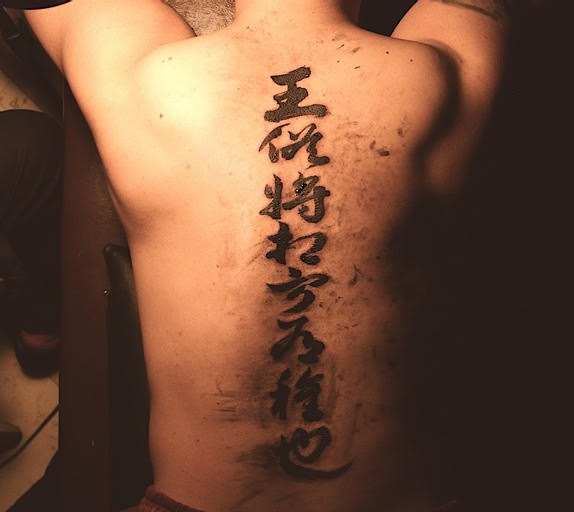
Last edited by Chris Knipp; 08-13-2021 at 03:14 PM.
-
BLUE ブルー ( Keisuke Yoshida 2021)
KEISUKE YOSHIDA: BLUE ブルー (2021)
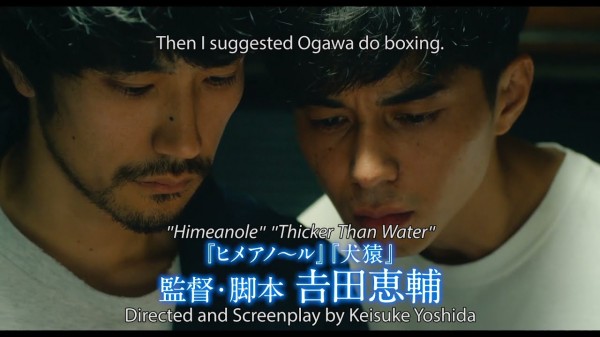
KENICHI MATSUYAMA, MASAHIRO HIGASHIDE IN BLUE
Losers' tribute
Blue is he color of the challenger's corner in Japanese championship boxing matches. The defender's is red. This film about boxing underdogs may teach you something about the sport. It goes into details analyzing matches more than any drama I've seen. You won't learn much about filmmaking. It's quite conventional in that area. But it celebrates a sport so compulsive you stick with it in the face of battering and loss.
The focus is a scruffy gym with the usual old beat-up coach and regular "stars." One, the handsome Kazuki Ogawa (Masahiro Higashide) has a chance. The unfortunate thing is that he may be suffering brain damage. The other, handsome, soulful Nobuto Urita (Kenichi Matsuyama) just keeps on losing every time. The only thing damaged may be his ego; but he always smiles, good humored in the face of a downbeat life. Both these actors almost seem chosen more for their good looks than their physiques: they seem a bit scrawny for boxers, even super welterweight ones. Nonetheless they perform well in detailed competition matches that are carefully analyzed.
Change enters this situation in the person of a restaurant employee, Tsuyoshi Narazaki (Tokio Emoto). He gets trounced at work by a middle school boy he confronts for smoking while under eighteen. He's so humiliated he decides to take boxing lessons - but only to learn how to move like a boxer. He has no intention of doing the deep training. This changes when he turns out to show talent and beats a cocky young guy who starts training at the same time, gets his professional accreditation, and may succeed in beating a tough ex-kick boxer who humiliated Kazuki. This is your surprise, come-from-behind story-line. Emoto is sort of homely looking and his condescending character has no charm. But as he discovers his talent and finds purpose in life through sport, he begins to grow on us, while Urita and Kazuki are relatively static. Their trajectory is simply accepting different kinds of defeat.
The film's unique angle isn't so much the outsider who finds a place in the gym, but the fact hat both its two "star" in-house boxers are both losers, Nobuto, the main character, literally losing every time, and Kazuki suffering increasing mental incapacity. Tsuyoshi's first in-house opponent, whom he beats on style and correct technique, is also a serious casualty, hospitalized later by a head injury and forced to stop boxing. Thus Keisuke Yoshida's movie, for all its loving detail about the sport, stands as a serious warning about its dangers.
James Hadfield, the veteran Japan Times film critic, has published a review . As he points out, Nobuto spends his time giving fitness lessons to middle-aged ladies. The other guy, Kazuki, was a longtime school friend whom he persuaded to enter boxing, and who has now not only eclipsed him in the sport, but taken over his childhood sweetheart, Chika (Fumino Kimura). Chika makes this also a wistful love triangle.
The haunting image is of the soulfully handsome Nobuto, aging yet youthful, smiling in defeat, meticulously analyzing fights but unable ever to put his knowledge into successful practice.
Hadfield calls Blue "a standout film that exceeds the time-honored genre’s usual tropes." Certainly it does show the fruits of what he reveals, that Keisuke Yoshiida, the director, is "a longtime boxing enthusiast in his own right" who "delivers a fantastic homage" to the "sport where individual transcendence results from the most grueling of consummate personal challenges." Blue indeed has these solid qualities. It still isn't a film that's very original in style. It's hard to show originality in such a familiar genre. This feature is, nonetheless, very watchable.
Blue is available in the FLC Virtual Cinema beginning August 9. Get tickets here.
Blue ブルー, 107 mins., opened in Japan Apr. 9, 2021. Its international festival debut was Jun. 5 online at Toronto Japanese Film Festival; also Shanghai Jun. 13, Udine Jun. 25. It was screened for this review as part of the NY Asian Film Festival (Aug. 9) and will show Aug. 21 at Hong Kong (Summer International Festival).
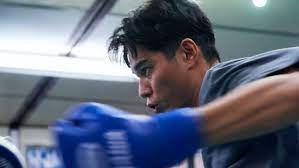
MASAHIRO HIGASHIDE IN BLUE
Last edited by Chris Knipp; 08-14-2021 at 10:35 AM.
-
TIME 殺出個黃昏 (Ricky Ko, 2021)
RICKY KO: TIME 殺出個黃昏 (2021)
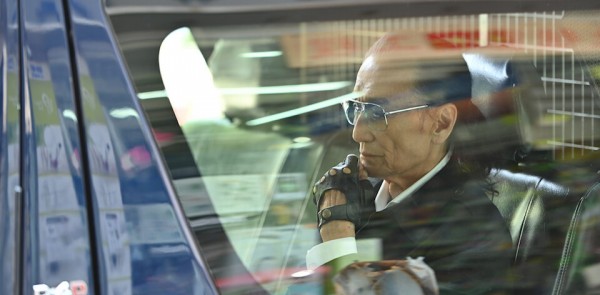
PATRICK TSE IN TIME
Once more with vigor
Chau (Patrick Tse), once-legendary hitman from the sixties, today is reduced to working as a noodle chef - and then he gets laid off from that, replaced by a high speed noodle-making machine. His two partners in crime from earlier days are similarly in lowered stations. Mrs. Fung (Bo Bo Fung, once the "Shirley Temple of Hong Kong") performs in a cabaret that she runs with her no-account son (Sam Lee); but her family want to take over her Hong Kong apartment and put her in a retirement home. The very large Chung (Lam Suet), once the best getaway driver, is now at best a security guard; he constantly visits a beautiful young prostitute he wants to marry; she is fond of him, but has quite other plans. These are three aging Hong Kong stars (of different ages, Tse being a steely 84, Fung a feisty, stylish 66, and Suet an imposing, wheezing 57) are united for a comedy that is partly about how hard it is to grow old when you were a hotshot, partly about how ill-served the elderly are by Hong Kong society and government. The film opens with a nostalgic flashback "hit" sequence from time past.
Patrick Tse dominates with his lean, erect elegance and his basilisk stare. He is like some Native American chieftain turned Asian and urban, and his character has a tough-love grandfatherly romance with Tsz-Ying (Suet-Ying Chung), a feisty, pretty schoolgirl who takes him on as her substitute family. (In real life Tse is known for his much, much younger wives and girlfriends, to this day.) When Tsz-Ying's high school beau gets her pregnant and is doing nothing about it, the three hitmen join forces and lower the boom, capturing the boy and torturing him till he promises to do the right thing. This is one of the central sequences in a modest budget but polished film full of deliberately absurd and classically cinematic episodes. As Chung, Lam Suet's sheer bulk, and how he can move it around, are memorable in themselves. Bo Bo Fung is magnificent as an aging lady unwilling to give up her legendary glamour. Her cabaret performances go on a bit long, perhaps, but they are still impressive - and she looks great all dolled up.
In a thread I'm glad isn't pursued very far though it's a good, if extreme, way of showcasing the ills of senior citizens, the trio team up for the "Elderly’s Angel" squad, with with Mrs Fung organizing, Chung driving, and Chau acting as the "guardian angel" to "serve" older persons requesting euthanasia. This means slitting their throats for a fee; Chau is famous for his small curved dagger, which he still wields with skill and aplomb. This program is unpredictable, and it's derailed when one of the clients turns out to be the adolescent girl Tsz-Ying, despondent because rejected by her parents and ignored by her boyfriend who got her pregnant. Her attachment to Chau gives her a new connection to life, even though he feigns indifference - at first, anyway.
The film is an interesting combination of Hong Kong acton movie nostalgia, comedy, and social commentary. It may be more appealing to aging Hongkongers than anybody else though, but younger local viewers have been known to find it side-splitting.
Time 殺出個黃昏 ("Burst into the dusk"), 99 mins., debuted at Hong Kong Apr 4, 2021. It showed at Nepal May 10 (internet), at Rotterdam Jun. 4 and at Udine Jun. 30. Screened for this review as part of the NY Asian Film Festival (Aig 6-22, 2021).
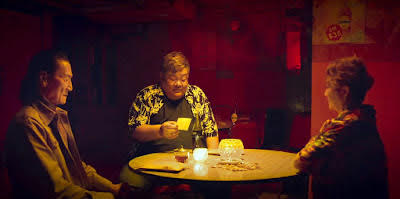
TSE, SUET AND FUNG IN TIME
Last edited by Chris Knipp; 08-14-2021 at 12:06 PM.
-
A BALANCE 由宇子の天秤 (Yujiro Harumoto 2020)
YUJIRO HARUMOTO: A BALANCE 由宇子の天秤 (2020)
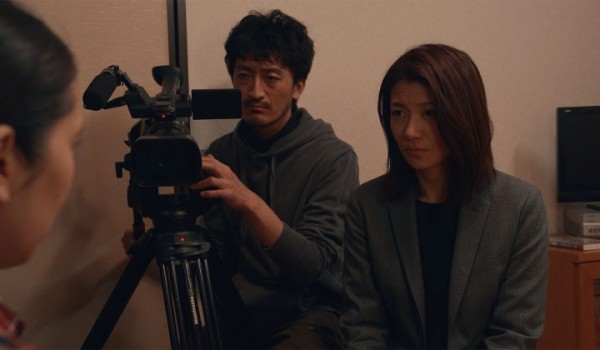
KUMI TAKEUCHI (RIGHT) IN A BALANCE
TRAILER
Suppose what you're making a documentary about happens to you
Asghar Farhadi has been mentioned and the ending struck me as having the stunning unresolved finality of Michael Haneke. This is to say Yujiro Harumoto's sophomore feature marks him as a significant talent, the kind who takes on big issues in complex ways. The linear narrative, weaving through several threads, starts with protagonist Yuko (Kumi Takiuchi), a very serious, quietly determined, and rather beautiful documentary filmmaker interviewing a man after he plays a flute by an urban-side river (the opening music is diegetic, and the rest is so austere there is no score). The parallelism that develops as the story line proceeds is a little gratuitous, and the whole film, which could have worked well as a miniseries, is pretty long. But A Balance has the excitement and the fascination of an investigative thriller with profound moral and social overtones. It moves at a measured pace but it's compulsive and propulsive.
Yuko is the final stages of shooting her documentary about a school scandal that led to two suicides - first of a schoolgirl, HIromi, accused of having sex with her teacher, which he denied, then of Mr. Yano, the teacher, who left a note saying his death is his protest against the injustice of the accusation against him. The flautist, Mr. Hasebe (Yuya Matsuura), was the girl's aggrieved father. Yuko seeks to tell the whole story, without taking sides, and also chronicle the repercussions from sensationalist media coverage that has left waves of ruined lives all around this scandal. The result is to be broadcast on television. Her stern encounters with her photographer and her producer (Yota Kawase) by the riverside in that first sequence show how principled and intense she is. But this is Japan and voices are never raised. There will be many telling little debates between Yuko and her producer, the latter a kind of middle man between idealistic filmmaker and business-savvy television executives.
Bureaucratic controls are strong, though, and we immediately see Yuko's desire to tell a complex story thwarted when in a meeting the suits of the TV station excise and rearrange lines of a the filmed interview to simplify scenes and make this simply a story about bullying: Mr. Hasebe's criticisms of mass media won't do.
Yuko seems wedded to her work, but her subtly hennaed hair has an elegant sweep and her no-nonsense clothes, if they're a hair shirt, look very good on her. But she's no movie-glamorous crusading journalist whose project is window dressing: the whole focus is on the unfolding information. on doing the work.
Yuko has other work as well, however, because she helps out as a tutor at the cram school of her father. Mr. Kinoshita (the meek-looking Ken Mitsuishi). One day she helps a girl student, Mei (Yumi Kawai), who's having a "heavy period." (Yumi Kawai, as Mei, is a quiet and subdued bombshell with dreamy eyes and bee-sting lips, a diminutive Asian Léa Seydoux.) It turns out Mei is pregnant, and she tells Yuko it's Mr. Kinoshita, her father, who is responsible. This could be the end of everything, the school, her father's livelihood, her career.
Yuko is still deep in her documentary. We've seen her do several very tricky and dramatic interviews with Mr. Yano's mother, Toshiko (Mitsuko Oka), who is now on the run, forced to move from one clandestine flat to another as her whereabouts are revealed on the internet. Yuko's reaction to the Mei situation is a reversal. Of course she gets her father to confess to his guilt. And whenever she faces someone in a compromising situation, her recording device comes out, and that habit remains. But of course she does not want to reveal Mei's situation to anyone, with "a balance" or otherwise.
Mei wants no one to know, least of all her father (Masahiro Umeda), a flaky young man who went to art school and sells contact lenses. Yuko embarks on damage control, consulting with a doctor friend - in his car - about the possibility of obtaining an illegal abortion drug used by immigrants that would keep Mei's pregnancy completely off the record. She also roundly rejects her father's pondered decision to confess his guilt. This idea, she sees at once, is both naive and egotistical on his part. Yuko and Mei become strange allies; and she she even starts being at Mei's flat and knowing her father. The flat is a mess, and he has been no kind of father, but he seems at a loss rather then evil.
Yuko's main goal here isn't to help her father or Mei, but to protect her documentary. In the end, doing that becomes more and more complicated, not because of personal matters but her unwillingness to compromise and the station's desire both to protect individuals and to tell a predigested story. The thrilling, unfinished ending shows Harumoto's flair for drama and his ability to hold us in the palm of his hand to the very last instant: brilliant. I hope it's not long before there's another film from this very talented writer-director.
A Balance由宇子の天秤, 153 mins., debuted at Pingyao, Oct. 11, 2020, and showed Oct. 25 at Busan (sharing the New Currents award with Three by Pak Ruslan); at Tokyo (FILMX) Nov. 2020; at Singapore Dec., at Macao (internet) Dec., at the Berlinale Mar. 2021 (Panorama section), at Tehran (the Fajr Festival) Mar. 2021, at Pyeongchang Jun. 2021, at Fribourg (Switzerland) Jul. 2021; it was screened for this review as part of the NY Asian Film Festival where it was shown Aug. 12, 2021.
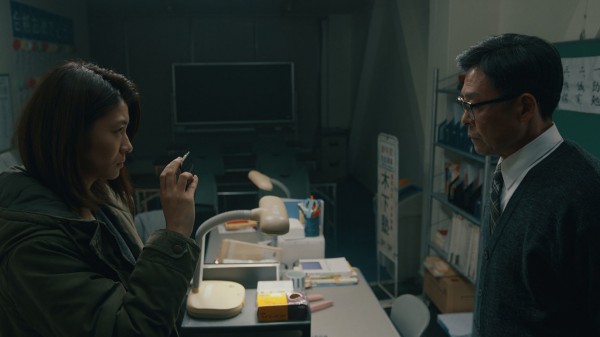
KUMI TAKUCHI, KEN MITSUISHI IN A BALANCE`
Last edited by Chris Knipp; 08-15-2021 at 01:06 AM.
-
SENSEI, WOULD YOU SIT BESIDE ME? 先生0、私の隣に座っていただけませんか?(Takahiro Horie 2021)
TAKAHIRO HORIE: SENSEI, WOULD YOU SIT BESIDE ME? 先生、私の隣に座っていただけませんか? (2021)
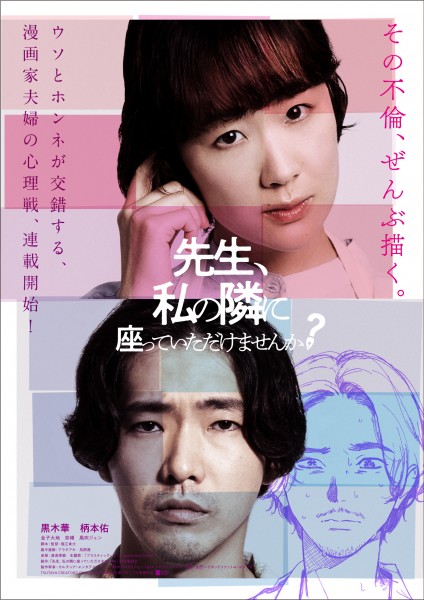
HARU KUROKI (TOP), TASUKU EMOTO (BOTTOM) IN SENSEI...
Living for manga
In his recent review of Sensei, Would You Sit Beside Me?, Reuben Baron reveals a much more detailed knowledge of Japanese manga than I have. This ins't difficult, since I know next to nothing. Mr. Baron may be right that speculations into the interface between the actual lives and the manga fantasies of real life "manga-kas," might be more interesting than the somewhat bland fantasy that unfolds in this new film. But if I may make bold to say so, he's a bit hard on this charming imagining of such an interface. The film is a bit long, a weakness of many of the NYFF Japanese crop this year. But it's quite engaging - and after the stern solemnity of Yujiro Harumoto's impressive A Balance, made a wonderful palate cleanser.
Toshio (Tasuku Emoto) and Sawako (Haru Kuroki) are what Baron cals a manga "power couple" whose creative and relationship difficulties overlap and combine to, at least, the eminent success of their careers. Toshio appears to be in a long period of creative dryness. Once a good while ago he as Sawako's teacher - hence the "sensei..." line, which has a playful double application. Now it appears they're been married five years, and Toshio has been having an affair with their editor, Chika (Nao Honda). One of the weaknesses of the film is we never see real signs of this affair or any chemistry between the actors playing Toshio and Chika. Rather like manga as seen depicted here, this film seems to be being made up in short spurts.
Emoto, who plays Toshio, is he best actor, with a range of gestures both comic and serious, which is a good thing because Toshio is the character whom we see the most and get the closest to. Toshio and Sawako go to the country to visit Sawako's mother (Jun Fubuki) - in her picture-perfect Japanese country house, whose ample summer coziness one relishes. Everything has a doll-like niftiness in this film, which is one of its charms: it's half-way a manga itself, and that's the point. In fact Haru Kuroki, who plays Sawako, has a doll-like sweetness that verges on the cloying. Not surprisingly, she turns out to have venom in her heart.
The trip to the country is meant to be distraction from the writer's block; Sawako too has it for the moment. She has finished a series, and can't think of a new one. The sojourn soon becomes a solution, after Sawako - somewhat oddly, at such a time and place - begins taking formal driving lessons. At first she reveals a phobia against driving, and can't seem to release the brake and step on the gas. But she perseveres, and soon starts spending all day away at the lessons, where Toshio must leave her and pick her up, and all evening drawing a new manga story. Toshio can't help sneaking peeks at each new sheaf of drawings, which Sawako conveniently leaves on a desk upstairs. Is Sawako making up what is happening, or is it really happening?
I have another question: does manga always consist of these saccharine, cutesy drawings of bland, spiky-haired youths? Does its content ever have any depth? I think the answer is yes, but that's not the kind of manga referenced here. Why is it, though, that the Japanese, who are so known for their historical epics like Kurosawa's Ran or films of sadness and profound redemption like his Ikiru, have such a love of cuteness and fey young men like Yuzuru Hanyu? (I admit I can never get enough of Yuzuru Hanu; but the manga drawings, ick.)
The fun of this film is the way once it gets going it runs back and forth between reality and the manga version, and the new sheaf of manga drawings Toshio peeks at turn into reenactments that may or may not be true. One really does get a sense of how some storytellers, old and new, may fray the line between their own lives and their creative mining of them. The depiction of this state of flux is enabled and made appealing by the gifted acting of Tasuku Emoto as Toshio. With limited material, he delivers a tragicomic range that is a real pleasure to watch.
Sensei, Would You Sit Beside Me? 先生、私の隣に座っていただけませんか?, 118 mins., premiered at the NY Asian Film Festival today, Aug. 15, 2021.
Last edited by Chris Knipp; 08-16-2021 at 09:50 AM.
-
ZOKKI (Takumi Saitoh, Naoto Takenaka, Takayuki Yamada 2020)
TAKUMI SAITOH, NAOTO TAKENAKA, TAKAYUKI YAMADA: ZOKKI (2020)
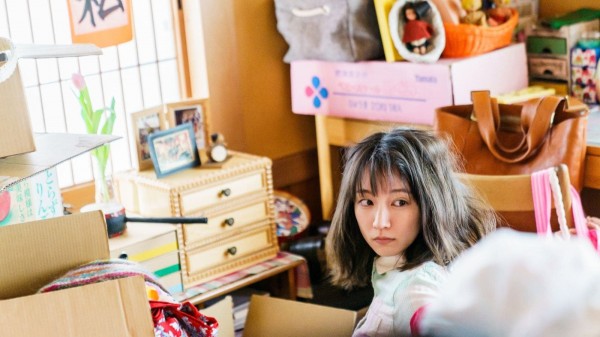
A manga tale collaboration
No, manga isn't all cute spiky-haired boys and girls like we see in Takahiro Horie's Sensei, Would You Sit Beside Me?, also in this year's NYAFF. This manga adaptation shows a far darker, gnarlier world with a whole panoply of people who aren't pretty like Horie's manga power couple..
Aki Kaurismäki comes to mind in this seamless anthology film blending two books by a celebrated manga artist in which humor teeters on the edge of drear. It is a comedy based on Hiroyuki Ohashi's manga Zokki A and Zokki B directed with different actors by three of Japan's leading actors and filmmakers. They blend together, but they don't. There are no clear-cut chapter divisions, and sometimes characters from one story briefly run into characters from another, all encountering each other in Ohashi's "obscure corner of the world" (an unbeautiful rural-urban part of Japan). But does it all blend together into some kind of unified whole? Not really. The project is the narrative equivalent of a surrealist "exquisite corpse," where artists connect their drawings to other artists' without seeing them. The title "Zokki" allegedly refers to the way paperbacks are bundled for sale in used bookshops. There you go.
And there is one young man - he looks too young to be working around porno - who repeatedly clocks in and out of a video rental shop, where there is a porn film featuring Mayumi Yusuda,,a star admiringly mentioned in segments, her tape first held by a nondescript guy who leaves home on his bike for points unknown in the film's first sustained scene. Later this gentleman is invited by an old fisherman to his shack, where he (the fisherman) gets a surprise birthday celebration. Later a friend of the fisherman turns up at the party hitherto unseen for some years, who has been in jail and can't go to his wife because they've had a fight. The fisherman begs the wandering cyclist, who's from the same town, to stop by some time and make peace with the ex-con's wife. Someone is moving the post-it notes to himself the video story boy is leaving overnight. Who is it?
These are the kinds of connections and threads the film works with. The most intense and memorable segment concerns two uniformed middle school boys. Makita, an ordinary, lonely boy and Ban, a tall, eccentric, shaven-headed, bespectacled one are the only friends each other has. As their friendship grows, Ban stops writing "I want to die" everywhere when that bent is replaced by an obsession with Makita's elder sister, whom he can never see because she doesn't exist; Makita has invented her to make himself more interesting to Ban. Makita uses a photo of Honda, a girl he was keen on in lower school as an object of worship for his crazy pal Ban. Later Ban seeks out the real Honda and asks her for a date. She rejects him but he is so persistent they eventually get married. Things go well he says, except she gets angry sometimes. The message of this seems to be that people who seem unbalanced when they are young may turn out to have normal lives.
Another sequence that gains some traction for a while focuses on a man and his little boy. The boy begs to be taken to an amusement park but his father refuses; he hasn't the money. Interchanges between father and son are vivid and amusing. The father instead takes his little boy on a jaunt where he breaks into his old school and steals a large punching bag from the boys locker room. The boy is well aware of the wrongness and danger of this exploit and is frightened, all the more so when his father temporarily runs off and the boy is approached by a mannequin that comes to life. Later the boy asks his father if she was a good or a bad spirit, and he says "That's a very good question." The story picks things up years later when the boy is grown up and the father, who still has the punching bag in his backyard, apologizes for his irresponsible parenting.
Makita, the nondescript schoolboy whose only friend is a deranged depressive; the numb, silent man who leaves home on a bike with nowhere to go; and the youthful drone working at the dreary job in the video store; even, though he has some flair, the irresponsible father, together build a sense that men are unimpressive and life contains little hope. This theme is alluded to also by a brief scene that opens the film between a girl and her aging grandfather, who declares that in life the happy moments are immediately followed by sad ones, and that the cycle grows closer and closer together with age so at last you cannot tell them apart.
This is a fascinating project, the three directors obviously have talent and the casting is excellent. The beauty is not in the generalizations but in the details. If it doesn't all hang together, perhaps that is the point. This would not be appealing to the more conventional moviegoer, of course. One wonders, if Hiroyuki Ohashi, the manga artist, had sset out to design his own film, from scratch, how he would have done it differently. Another filmmaker, also Scandinavian with whom this has much in common is Roy Andersson, of About Endlessness. But this doesn't reach for the sweet irony of Kaurismäki or the beauty and poetry of Andersson.
Zokki, 113 mins., premiered at Tokyo, also featured at Taipei (Golden Horse), both Nov. 2020; Shanghai Jun. 2021; screened for this review as shown on the internet as part of the NY Asian Film Festival Aug. 16, 2021.

THE VIDEO SHOP IN ZOKKI
Last edited by Chris Knipp; 08-16-2021 at 03:13 PM.
 Posting Permissions
Posting Permissions
- You may not post new threads
- You may not post replies
- You may not post attachments
- You may not edit your posts
-
Forum Rules





 Reply With Quote
Reply With Quote











Bookmarks